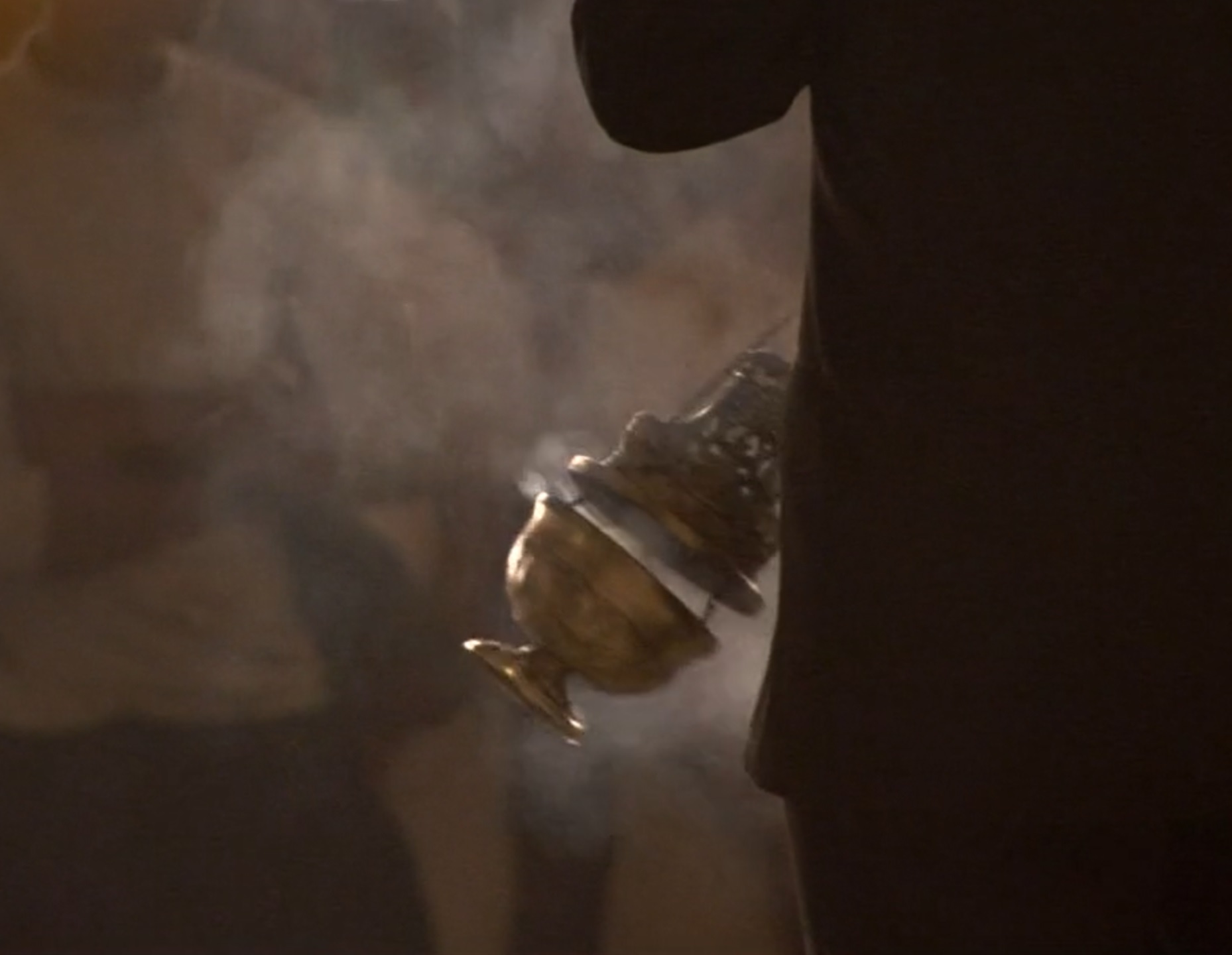
Incense refers to any substance, though usually aromatic, that when burned or heated emits a fragrance, as well as to the fragrance itself. Unlike our modern existence when most things are powered by electricity, all sources of heat and light for domestic purposes came from burning something, chiefly wood, leaves, dried dung of domestic animals, and oils. While serving their intented purposes, they also created problems and inconveniences of their own; walls got sooted up and the smells they emitted were not always pleasant. The fragrance of burning incense—usually inexpensive materials like certain dried flowers, scented twigs, bark or their resin, and seeds—masked out odours, giving the impression that the air is thus cleansed and purified. It is easily understandable how these fragrance soon came to be associated with the idea that purity, and, therefore, something worthy of being offered to the to deities. Possibly because of this the offering of incense in worship was near universal in the ancient world.1
Incence is mentioned more than 150x in the Bible, chiefly in the levitical worship reported in the Old Testament. The Hebrew word qetoreret can also refer to smoke or the smell of the sacrifices, and is often (about 20x) qualified by the plural participle sammim, 'spicy,' and usually translated as "fragrant incense."
The instructions regarding the use of incense in Israelite worship are provided in Exo 30. The formula for the incense was simple: frankincense, storax, onycha, and galbanum (Exo 30:34), all of them expensive, especially the first. Anything else used as incense in worship was considered "strange" (zarah, v9). These were ground and mixed accordingly (v34), and sprinked on burning charcoal in a special bowl, the censer, before it was placed on a special "altar of incense" made especially for it (v1; also 31:8). This particular mix of incense was to kept for use in worship only and was forbidden for domestic use ("Do not make any incense with this formula for yourselves; consider it holy to the Lord," v37); and "whoever makes incense like it to enjoy its fragrance must be cut off from their people" (v38). In the normal course of the administration incense was to be burnt in the morning and again in the evening (vv7-8). While the incense may be added to a number of sacrificial offerings it was not to be added to any "sin offering" (Lev 5:11).
The administration of incense burning was taken with great seriousness; that the Lord should command that the formula used should be "holy" shows that He took it seriously. The point was driven home when Nadab and Abihu, Aaron's sons, were struck dead by the Lord when they "took their censers, put fire in them and added incense; and they offered unauthorized fire before the Lord, contrary to his command" (Lev. 10:1). (To appreciate the entire episode, which many people find shocking, read the commentary on this passage.)
Though the practice of offering incense is noted frequently in the Bible, its significance was assumed, at least in the OT to be self-evident. Incense is mentioned only infrequently in the NT; only 8x (3x in Lk; 1x in Heb; and 4x in Rev). Rev 5:8 describes a scene in heaven with the four living creatures and twenty-four elders falling down before the Lamb, each holding a golden bowl "full of incense, which are the prayers of God's people." This is, of course, a metaphorical interpretation, and very possibly recalls Psm 141:2, "May my prayer be set before you like incense; may the lifting up of my hands be like the evening sacrifice."

May Christians burn incense as part of their worship? Google the question and you will find all sorts of answer. Orthodox churches has used incense as part of their worship for centuries. Though this, of itself, does not validate its use, it suggests that the real answer depends on one's motive for using, or wanting to use, it. It can be a very lifting symbolic gesture such as we see in John's vision, with the incense ascending as "the prayers of God's people." The most important thing, as in all symbolic expressions is that we do not allow them to slip into a mere habit or, worse, superstition. If one should choose to do so, it is vital, therefore, that its symbolism should be taught clearly and repeatedly (particular when there may be visitors around who have no way of otherwise appreciating what is going on).

Notes:
1. Menahem Haran, "The Uses of Incense in the Ancient Israelite Ritual," Vetus Testamentum 10.2 (1960):113-129 (113).

Read the entry in:
Eaton's Illustrated Bible Dictionary
International Standard Bible Encyclopedia

©ALBERITH
050822lch